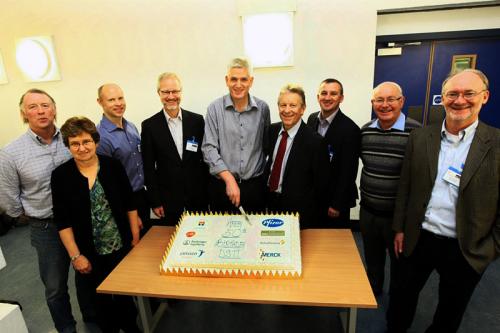
MRC-PPU, College of Life Sciences and DSTT companies celebrate milestone
The University of Dundee's award-winning Division of Signal Transduction Therapy (DSTT) has this week celebrated the 50th meeting of the collaboration, which brings scientists at the University together with the world's biggest pharmaceutical companies.
Established in 1998, DSTT is a unique collaboration between researchers in the MRC Protein Phosphorylation and Ubiquitylation Unit (MRC-PPU) at Dundee and six global pharma giants - AstraZeneca, Boehringer Ingelheim, GlaxoSmithKline, Janssen Pharmaceutica, Merck Serono and Pfizer.
Professor Dario Alessi, Director MRC-PPU, said, 'This is an incredible milestone for us to reach. Since the collaboration started in 1998 we have held several meetings in Dundee each year. These three-day meetings include a scientific symposia to present our latest research data and a series of one-to-one meetings with research groups as requested by the companies'.
'These meetings prove extremely valuable in disseminating our latest results and assisting companies with their development programmes'.
Established in 1998, DSTT is a unique collaboration between scientists in the MRC-PPU, signalling researchers at the University of Dundee's College of Life Sciences and six of the world's leading pharmaceutical companies (AstraZeneca, Boehringer Ingelheim, GlaxoSmithKline, Janssen Pharmaceutica, Merck Serono and Pfizer).
The research focuses on the understanding of the biological roles of phosphorylation and ubiquitylation and how disruption of these processes cause human diseases such as neurodegeneration, cancer, hypertension and immune disorders. The ultimate goal of the MRC-PPU research programmes is to help develop new improved strategies to treat disease.
The DSTT is widely regarded as a model of best practice in the interaction between academia and industry, and it was awarded the Queen's Anniversary Prize for Higher Education in 2006. A key remit of the research undertaken in Dundee is to help define and validate new drug targets with the aim of obtaining sufficiently convincing results to persuade pharmaceutical companies to develop drugs against these targets.
Established in 1998, DSTT is a unique collaboration between researchers in the MRC Protein Phosphorylation and Ubiquitylation Unit (MRC-PPU) at Dundee and six global pharma giants - AstraZeneca, Boehringer Ingelheim, GlaxoSmithKline, Janssen Pharmaceutica, Merck Serono and Pfizer.
Professor Dario Alessi, Director MRC-PPU, said, 'This is an incredible milestone for us to reach. Since the collaboration started in 1998 we have held several meetings in Dundee each year. These three-day meetings include a scientific symposia to present our latest research data and a series of one-to-one meetings with research groups as requested by the companies'.
'These meetings prove extremely valuable in disseminating our latest results and assisting companies with their development programmes'.
Established in 1998, DSTT is a unique collaboration between scientists in the MRC-PPU, signalling researchers at the University of Dundee's College of Life Sciences and six of the world's leading pharmaceutical companies (AstraZeneca, Boehringer Ingelheim, GlaxoSmithKline, Janssen Pharmaceutica, Merck Serono and Pfizer).
The research focuses on the understanding of the biological roles of phosphorylation and ubiquitylation and how disruption of these processes cause human diseases such as neurodegeneration, cancer, hypertension and immune disorders. The ultimate goal of the MRC-PPU research programmes is to help develop new improved strategies to treat disease.
The DSTT is widely regarded as a model of best practice in the interaction between academia and industry, and it was awarded the Queen's Anniversary Prize for Higher Education in 2006. A key remit of the research undertaken in Dundee is to help define and validate new drug targets with the aim of obtaining sufficiently convincing results to persuade pharmaceutical companies to develop drugs against these targets.

